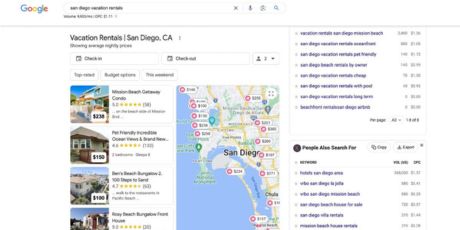CHAPTER 2
Keyword Research for Vacation Rentals
CHAPTER SECTIONS
In this section, you will discover what keyword research is and why it matters as you build your vacation rental brand. You will learn about a variety of topics related to keywords, including the following:
- What is keyword research?
- Common metrics related to keyword research
- What keyword research can tell you about your rental business
- What are long tail keywords?
- Why is keyword research important for property managers?
- How to brainstorm keywords for vacation rentals
- How to find the right keywords
- Understanding search intent
- How to categorize keywords into topics
What is Keyword Research?
Keyword research is the process of finding the right keywords for your vacation rental site. These should be keywords that you can naturally incorporate into content on your site to resonate with your target customers.
Keywords are largely subjective, depending on what types of properties you have available and the kinds of travelers you are trying to reach. However, a few important metrics can drive your keyword choices.
Common Metrics Related to Keyword Research
To understand keyword research for vacation rentals, it’s important to get an overview of the metrics related to the keyword data you are going to study.
Monthly Search Volume
Monthly search volume is generally an average of the total annual number of searches performed for a given query divided by 12 months.

Take this example below for “big bear vacation rentals”.
The total MSV (monthly search volume) for this query is 2,900 searches per month.
At best, this is a conservative estimate of the actual number of queries users typed into Google — or other search engines, which have separate data points.
A large majority of search data comes right from the search engine itself. In the case of Google, a lot of data comes from Google’s ad platform and can be accessed by SEO tool companies through the Google Ads API.
Seasonality & Search Trends
Seasonality plays a big factor in these search volume numbers.
Due to the dual season in Big Bear, they have a peak in July before the summer season, then a dip or shoulder season but just as the winter ski season starts ramping up so does the search volume for this keyword.
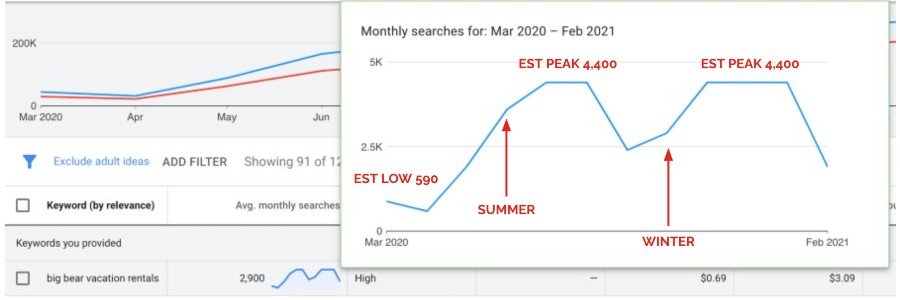
According to this data from the Keyword Planner, their destination only gets about 590 monthly searches during the low season. So it’s important to look at trends as well when choosing keywords.
*Note that Keyword Planner only provides a vague range of search volume like 1k – 10k (which is largely useless) if you don’t have access to an active Ads account.
Some keyword research tools will also give you seasonal trends, but for the most part, this number is coming from Google and is pretty standard on research tools in the industry.
Here’s a screenshot from SEMrush, highlighting their search trend chart.
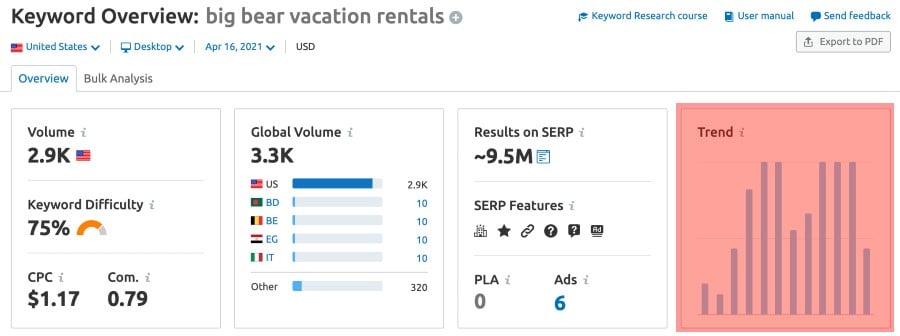
Clickstream Data
The other variable here is clickstream data. This data captures how a searcher navigates through the internet — from where they start their journey to where they enter the keyword you are studying and what kind of site they end up on.
This data can be used to inform better decisions because it provides more data about the full path of the user after searching, not just the demand of a search query.
How these companies get this data and the other nuances of using this data is out of scope for this guide but it’s good to know whether or not you can trust your data.
Some tools, such as Wordtracker, Moz and Keywords Everywhere, blend Google ad data with clickstream data to come up with their estimated search volume.
Cost Per Click (CPC)
CPC is the amount of money you spend in a pay-per-click (PPC) campaign every time someone clicks on your ad in the search results. CPCs depend on which keyword you are targeting with your ad campaign. The most competitive keywords tend to have the highest CPCs.
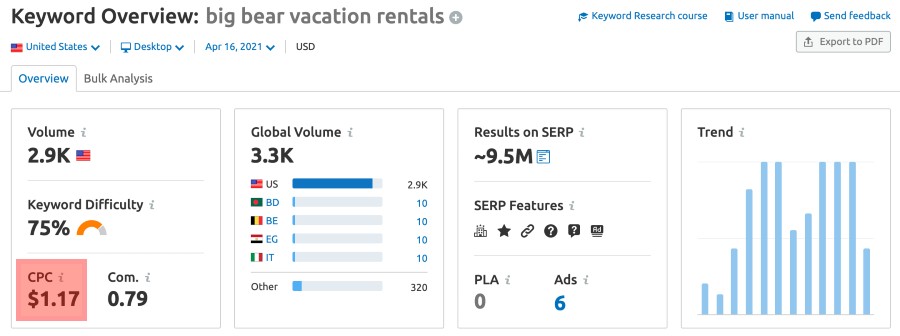
Keyword Difficulty
Keyword difficulty blends a few factors, such as the number of search results and the backlinks of the websites ranking on the first page for the given keyword. This is to give you an estimation, on a number scale, meant to tell you how hard it will be to rank your vacation rental site for this keyword.
The higher the number, the harder it is to rank due to the current competition on the first page of search results.
SEMrush Keyword Difficulty
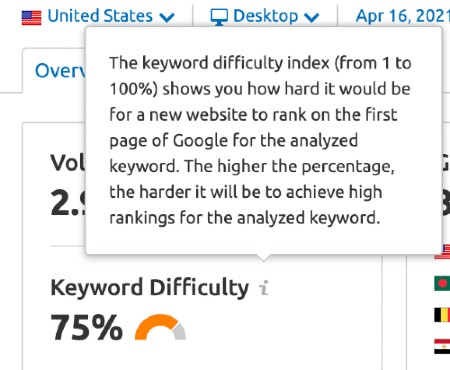
Ahrefs Keyword Difficulty
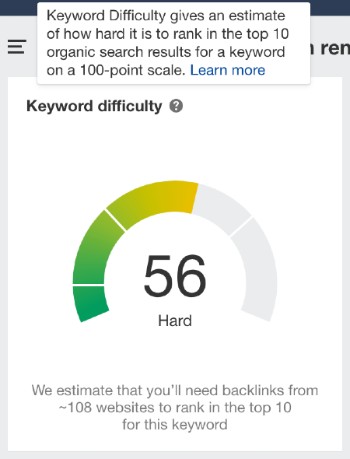
Competition
Competition is similar to keyword difficulty in that it tells you how hard it might be to rank for a particular keyword, but this metric focuses more on the paid side of digital marketing. More specifically, it looks at the number of advertisers who are bidding on the advertisements in the Google results.
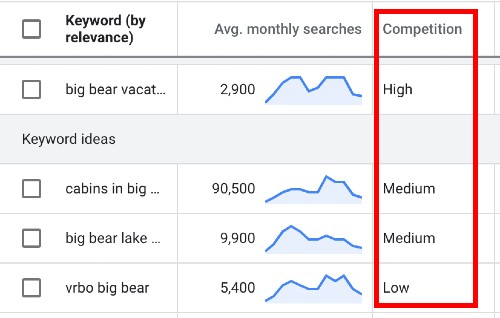
What Can Keyword Research Tell You?
Keyword research should be the cornerstone of any SEO efforts you make for your vacation rental business, but it can also tell you a few things about your business and local area that could be useful.
See below for two key examples of what vacation rental keyword research can tell you.
How Many Travelers Are Searching for Accommodations You Offer?
You know when business is good or slow, but do you know how many people actually search for exactly what you have to offer every month?
Keyword research can help you understand that. If you find that a keyword that perfectly describes your vacation rental business is searched 320 times per month, you know that’s a good guess as to how many searchers are looking for precisely the accommodations the keyword at hand describes.
How Many Travelers Are Searching for Your Region?
Maybe they don’t all know they want your exact short-term rental. Wouldn’t it be nice to know how many people are actually interested in traveling to your region in the first place? This can help you understand your business’ potential growth, the competition you face and other business moves you can make.
Keyword research can help you gain the fullest possible understanding of who is searching online for your region. Simply identify a keyword that includes your region and some indication that the searcher is considering travel, and the search volume tells you all you need to know.
What Are the Trending Topics in Your Region?
Since most keyword research tools are seasonal or even a representation of the past search history of your visitors they’re not always the best tool for finding trending topics. Ever wonder what people are searching for right now or what they might be searching for in the near future?
No, unfortunately there’s no crystal ball for keyword research.
Google Trends is one of the closest tools that allows us to predict what search trends exist from looking at past trends as well as current spikes in search volume.
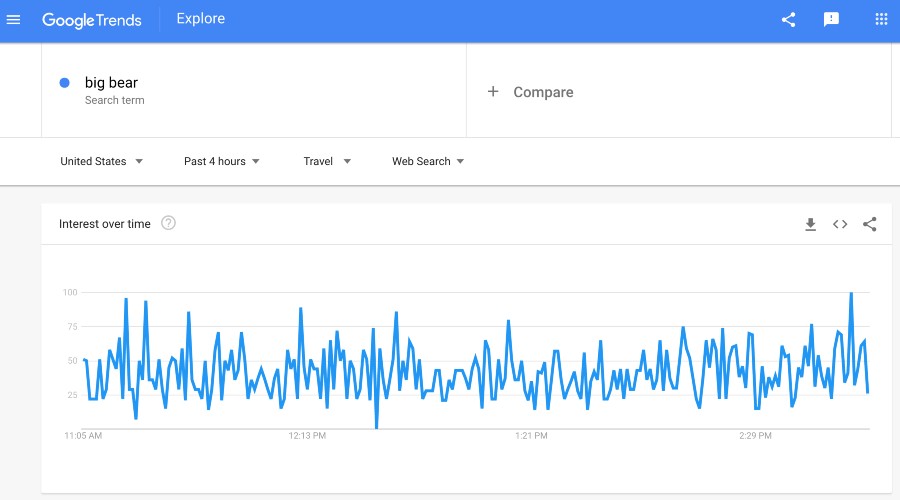
You can even narrow this down to just show Travel searches or, in some cases, searches from the past 1 hour! Pretty powerful.
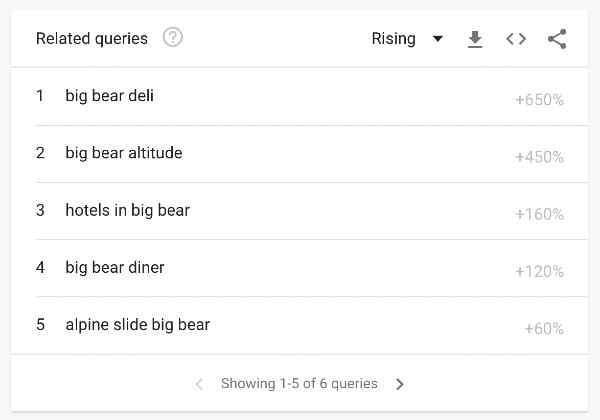
Some of the broader queries will show you estimates or predictions on what Google expects people to search for based on multiple data sources.
Understanding Longtail Keywords
Longtail — or long-form — keywords are phrases or questions that are somewhat longer than traditional keywords. They often start with words like “how,” “where” and “which.” An estimated 70% of all page views come from longtail searches, so it is certainly worth putting in the legwork to understand this concept.
In the world of keyword research for vacation rentals, longtail keywords can represent huge opportunities when you are competing with the giants like Airbnb and Vrbo.
Why? Because these companies are using their enormous SEO budgets to rank for big keywords like “San Diego beach condo.” But they might not be targeting “pet-friendly beach condos in San Diego.” That means you can target that phrase and rake in all the potential customers who search it.
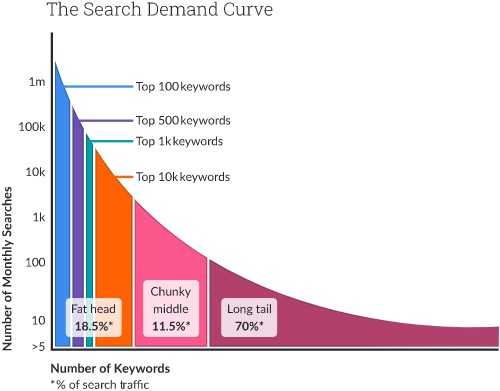
Why Is Keyword Research Important for Property Managers?
Property managers should care about keyword research for several reasons.
First, it can help you figure out what type of content you need on your website.
“Keyword targeting” is a practice that allows property managers to utilize specific keywords that are most likely to attract their desired audience — in other words, your website will feature the search terms your demographic is probably going to enter into Google.
Keyword research will also give you insight into what travelers are searching for overall. This can help you make tweaks to your website to increase its appeal.
If, for example, you discover that many vacationers are looking for pet-friendly properties, and this isn’t something you’ve addressed on your site, you’ll know you need to add a page about your pet policies and pet-friendly properties.
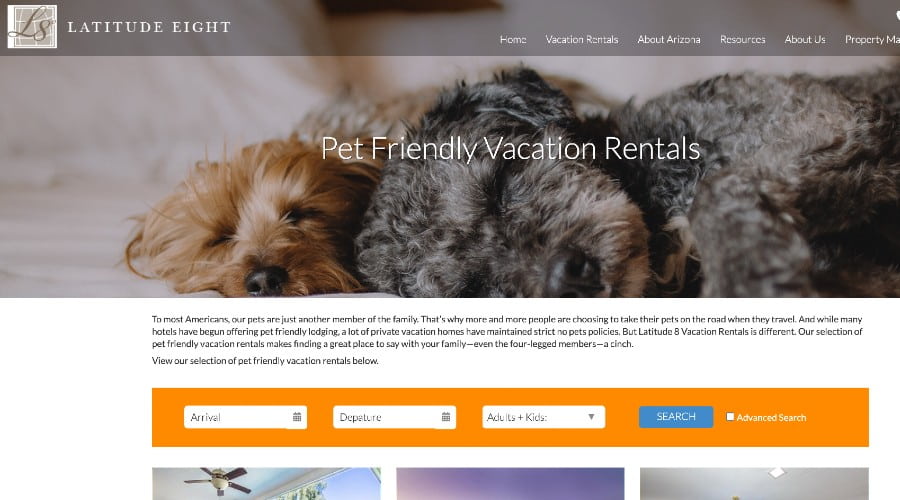
Finally, doing keyword research is an excellent foray into SEO at large. Keywords are the foundation of search engine optimization, so the more you understand about how travelers are searching, the better you will be able to make your property management website.
In fact, the client in the case study below generated a large portion of that traffic from the keyword research efforts that went into researching their destination.
How Do You Brainstorm for Vacation Rental Keyword Research?
Doing keyword research doesn’t have to be overwhelming. By breaking the process down into simple steps, you’ll be able to figure out the right keywords for your vacation rental business in no time.
1. Outline the Types of Homes You Rent
The first step is to really think about what types of vacation rental properties you specialize in.
If, for example, you offer ski-in/ski-out chalets on a mountainside, that will likely be the first part of your search term. The same goes for “beach bungalows,” “rustic cabins” or “oceanfront condos.”
Below is a snapshot of a feature from Google Keyword Planner called Refine Keywords (which is still in beta) that allows you to quickly refine, or filter out, specific types of housing keywords from our original term “big bear vacation rentals”.
There’s several ways to do this with other tools as well.
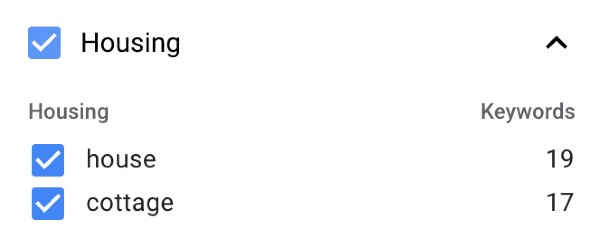
2. Add the Location
The destination should be an actual location on the map, not a generic term.
If your vacation properties are all located on the Caribbean island of St. Thomas and you specialize in beachfront houses, you might want to use the search term, “St. Thomas beach houses.”
As in the example above, using a general term that describes the scenery near your vacation properties is also crucial as you conduct keyword research for vacation rentals. Think of terms like “beach,” “mountain,” “lakefront” and similar.
3. Think About Local Culture and Activities
When people look for vacation properties, they often search for areas that have interesting things to do. This might include museums, sports arenas, national parks and other leisure activities. Consider what is available in your target area when you do vacation rental keyword research.
Dining Keywords
Dining is important because travelers don’t want to cook all the time when they rent vacation homes.
They want to experience local flavor!
Consider popular restaurants in your area and what types of food they serve. Remember, travelers are more likely to search by general sorts of food (Mexican, Chinese, etc.) than by specific restaurant names.
Landmark Keywords
If the area where your vacation properties are located has any notable landmarks, such as monuments or historic buildings, it is worth noting when you are conducting keyword research.
Some people search for accommodations near the primary attractions for their vacation, so terms like “NYC rental condos near Times Square” and “D.C. short-term rentals near National Mall” can be valuable if they describe your offerings.
Attraction Keywords
Attractions can be anything from a local amusement park to a historic monument. Think about your local area and what people from out of town generally like to do when they’re visiting — that’s an attraction!
If travelers are searching for reasons to visit your city, you can inform them and show them why your vacation rental is right for them.
How Do I Find the Right Keywords for My Short-Term Rental?
Finding keywords is great, but finding the right keywords is the key to success. Now that you’ve outlined your keyword focus, how do you go about actually finding the keywords that you want to target?
Below are a few methods and tools for getting started.
Manually Review Your Competitors
You know who your competitors are. Now, it’s time to manually review them to see which vacation rental keywords they’re using, how they are approaching their content and how they are structuring their sites.
Review Their Content
Begin by reviewing your competitors’ overall content.
See what keywords they seem to be using frequently (but remember that keyword stuffing is ineffective and frowned upon).
Take notes as you read. You may find obvious keywords you simply never considered before.
Review Their Title Tags
Title tags are the clickable headline that search engines display to their users on the SERPs.
They are critical for drawing people into your website and play a major role in both SEO and social media sharing.
Review Categories and Navigation
Although they may not be immediately obvious, categories and navigation also play a major role in SEO.
Carefully look through how your competitors’ sites are laid out and what their menu options are.
Then, assess your own site and see if it seems more confusing in comparison.
Review the Market Leaders
After you look at your direct local competitors’ websites, check out the “big guns” in the vacation rental game right now. There are many listing sites in the market so we’re only looking at a few examples.
The following three websites are probably where most of your prospective clients are booking: Vrbo, Tripadvisor and Airbnb.
Once you have a better understanding of how Vrbo, Tripadvisor and Airbnb operate, you’ll be able to make the necessary tweaks to your own website in order to better compete from an SEO standpoint.
Airbnb
The newest and trendiest of these websites, Airbnb’s site offers both form and function.
In addition to helpful reviews and minimal design that really showcases each property’s photos, there are neighborhood guides to help people choose the perfect rentals for their needs.
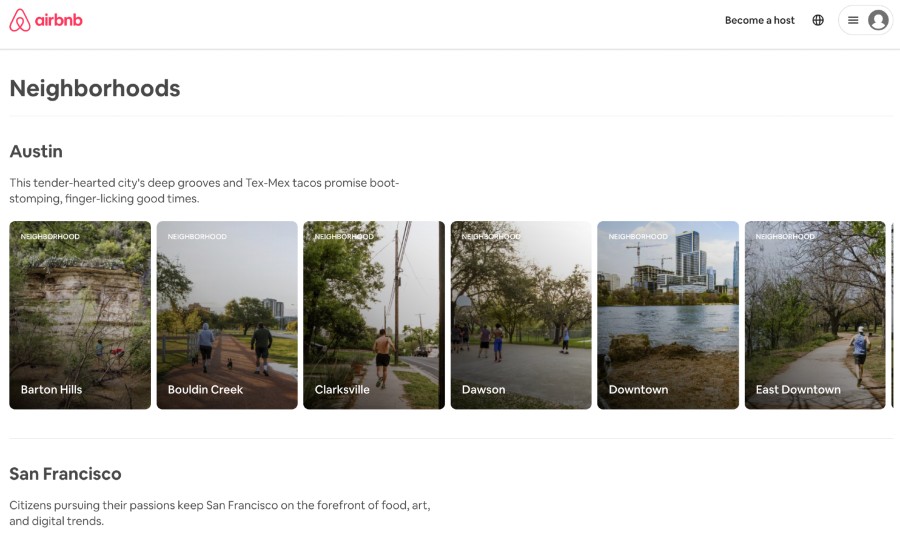
Vrbo (HomeAway)
Vrbo isn’t as slick as Airbnb, but it offers exceptional functionality for people who want to know the ins and outs of the properties they are considering.
It provides full details about each vacation rental option and has excellent on-page SEO.
Tripadvisor
Tripadvisor is arguably the most review-driven of this trio — it relies heavily on local recommendations from guests to rate properties.
Keyword Research Tools
To speed up the research process, you can use keyword research tools (some are classified as competitor research tools) that are made specifically for coming up with new keyword ideas, related key phrases, and competitor keywords.
Free Keyword Research Tools
If reviewing competitors and the market leaders hasn’t yielded enough vacation rental keywords for you to target, free keyword research tools may be able to fill in the gaps.
‘People Also Ask’ and ‘Searches Related To’
Google’s “People Also Ask” and “Searches Related To” sections can help you think of content you might not have realized was important otherwise.
You can find these sections in the SERPs when you search terms related to travel in your area and local attractions.
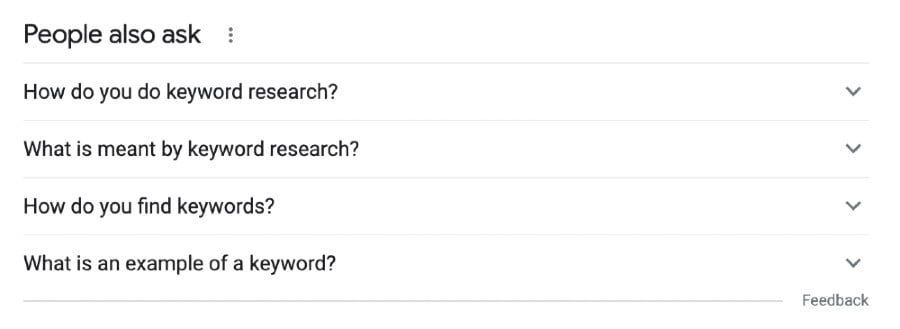
If, for example, you run a property rental company in the Caribbean, you might not have a page on your site specifically dedicated to hurricane season. But when you search a keyword related to your area, you might note that the “People Also Ask” section has questions about hurricane season.
This could help you realize that publishing content about hurricane season could help you get a leg up on the competition because people want to know what they should expect during that time of the year.
Vacation Rental Forums
Like “People Also Ask” and “Searches Related To,” vacation rental forums are a great place to see what people really want to know when they visit a property management website for any destination.
Check the forums for well-known travel websites like Fodor’s and Lonely Planet to get started.
See what people are asking about your destination. Chances are that they will google those questions, and you have a chance to be the first search result if you target your content to those queries.
Google Keyword Planner
Google Keyword Planner is an excellent free tool for those who are interested in commercial search terms.
This simple interface is specifically designed for optimizing Google Ads campaigns for particular keywords, but you can use it to get an idea of how many people are searching specific phrases related to your vacation rental business.
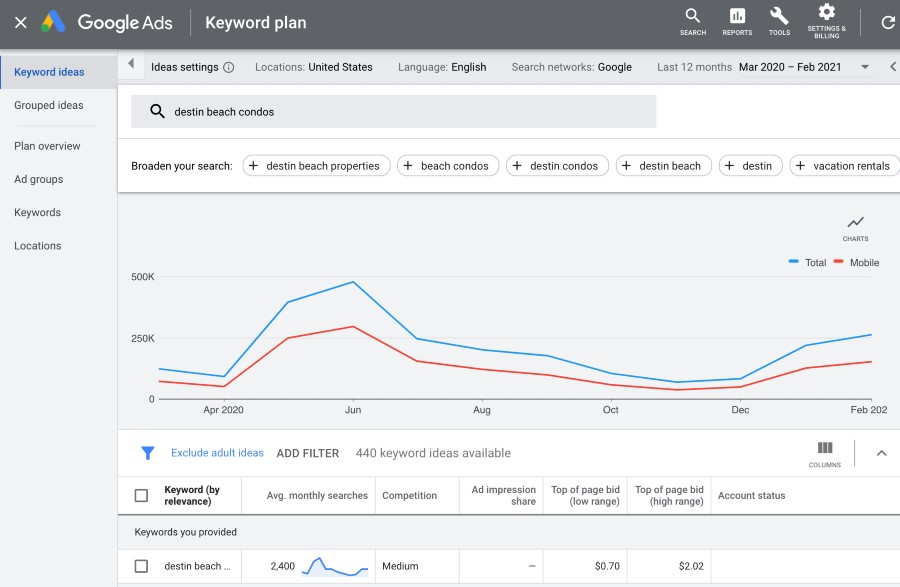
Google Search Console
Google Search Console offers a number of tools.
You can, for example, get detailed technical data on items like how long it takes for a page on your site to load or even reindex a page with Google after you have updated it.
You can also see what people are searching and when those searches cause them to click on your website or simply see it in the SERPs. This can inform your keyword strategy.
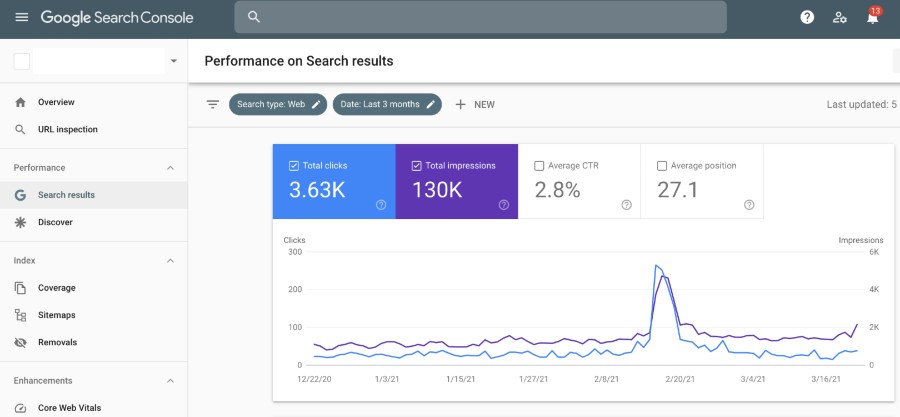
YouTube
Although you might not realize it, YouTube is a powerful SEO tool.
Not only does it provide property managers with many vacation rental SEO tutorials, but it can help you understand what people want to see when they visit your area.
Check out the videos related to traveling to or staying in your location. Could you create a page on your website that targets similar subjects and keywords? You may find some golden opportunities.
PRO TIP
Many of the popular keyword research tools have a setting specifically for YouTube research. Just select this option and enter your destination.
Here’s Ahref’s Keyword Explorer
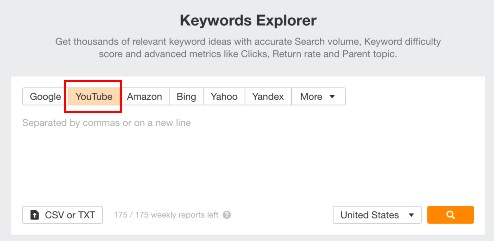
And KeywordTool.io’s YouTube feature

Answer the Public & KeywordTool.io for Longtail Research
Longtail keywords for vacation rentals can cause you to get more specific in your content as you try to answer readers’ queries.
Instead of titling a section of your website simply “Beaches,” for instance, you might discover that the longtail phrase “condo near white sand beach Bermuda” is a better option.
Both Answer the Public and KeywordTool.io provide a wealth of related questions and longtail phrases when you enter a search term like those above.
Plus, you get a cool chart with Answer the Public (see below).
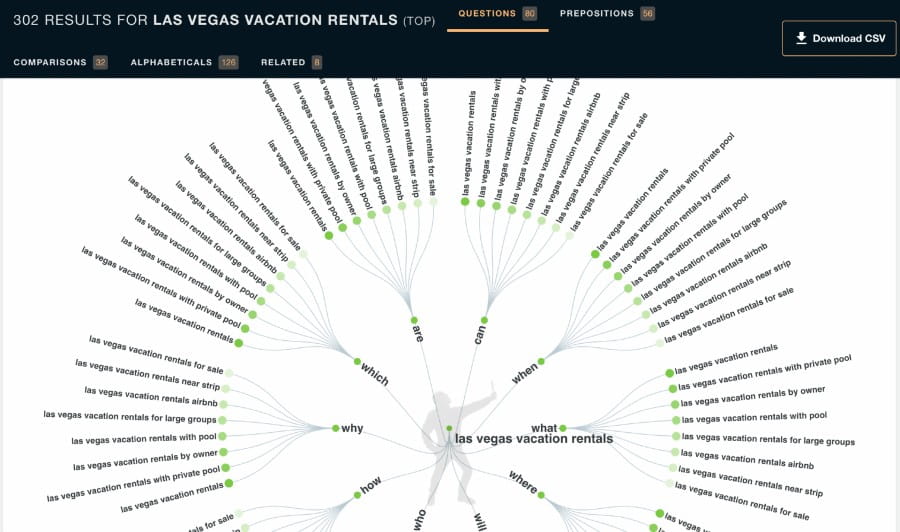
UberSuggest
When you visit Ubersuggest, all you have to do is type in a domain or keyword to start searching for keywords for your vacation rental business. The tool pulls from its own data sets to give you lots of keywords options.
It really is that simple.
Although this tool isn’t as comprehensive as some of the paid keyword research tools that are listed below, it does provide helpful analysis for vacation property managers who aren’t yet ready to dive in financially.
Paid Keyword Research Tools
All four of the following keyword research tools require payment in order to utilize all of their features. Some, like Moz, do have certain blog posts that you can read for free.
If you are ready to overhaul your vacation rental website’s SEO from the ground up, one or more of these services is likely to be essential for you moving forward.
They provide more customized assessments and additional analytics than free services.
- SEMrush
- Ahrefs
- Moz (Keyword Explorer)
- Keywords Everywhere (Chrome Browser Plugin)
- and more…
What Is the Best Keyword Research Tool?
Each of the keyword research tools we have covered offers unique pros and cons, so the best keyword research tool is going to be the one that most closely matches your needs.
If you’re looking for commercial keywords, Google Keyword Planner is likely your best. SEMrush is typically strongest on the number of keyword ideas. Meanwhile, Keywords Everywhere and Answer the Public are hard to beat in the longtail keyword arena.
Finding the best keyword research tool is likely to involve some trial and error on your part. Take advantage of free trials and use each tool to its full extent.
Once you’ve tried a few, pick the one that is giving you the best results.
Queries and Search Intent
Once you have a large list of vacation rental keywords, it’s important to consider the search intent of those keywords to be sure you’re targeting the right types of phrases.
Knowing your target guests’ search intent is key to success when it comes to picking the right keywords for your website.
What Are the Most Common Types of Search Intent?
Put simply, the search intent of a keyword is the searcher’s goal in typing the keyword phrase into Google.
While search intent can vary from person to person and keyword to keyword, there are a few categories of search intents that are common in the vacation rental industry.
These include informational, commercial, navigational and transactional search intents:
- Informational. The searcher is seeking information about how to do something, a general subject, a specific person or celebrity or a similar topic (e.g., “how to exchange money in Costa Rica”).
- Commercial. The searcher is investigating particular companies, products or services (e.g., “Airbnb vs. Vrbo”).
- Navigational. The searcher is trying to reach a specific website by typing a phrase into Google (e.g., “Tripadvisor login”).
- Transactional. The searcher intends to make a purchase at some point soon (e.g., “affordable cabin rentals near Lake Michigan”).
Most of the keywords in your research will fall into either Informational or Transactional.
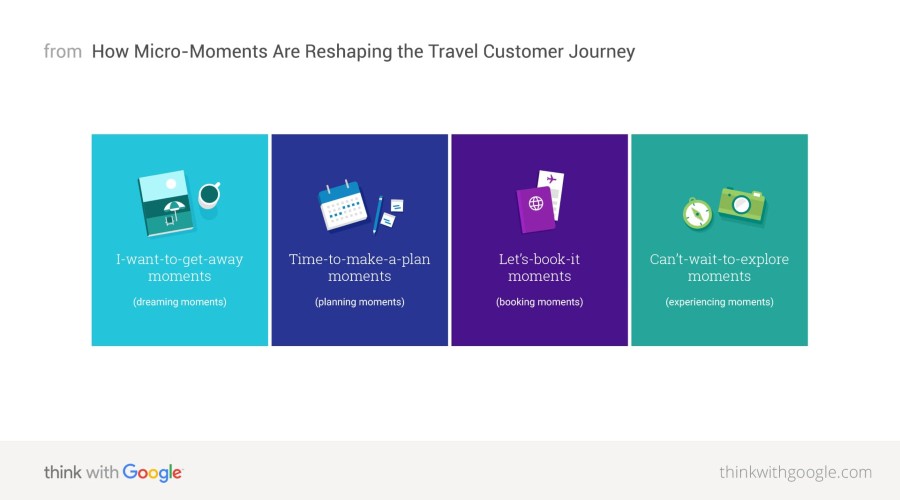
Google defined several travel-related stages during a typical traveler’s journey and called them travel micro-moments.
- I-Want-To-Get-Away Moments. The searcher is seeking inspiration and “dreaming” about their next trip. These searchers are very unlikely to complete a booking but that doesn’t mean you shouldn’t introduce them to your destination.
- Time-To-Make-A-Plan Moments. At this stage, the searcher has decided on a destination but is now comparing the cost of flights, accommodations, and other necessities.
- Lets-Book-It Moments. At this point, they’re hovering over the Book Now button and are all set to pay for their trip.
- Cant-Wait-To-Explore Moments. After they’ve booked and made all of their plans, they’re now doing additional in-depth research on the destination. This is where you can get additional use out of your local guide.
Google is encouraging travel brands to be sure they are relevant and visible at each stage of the travel journey to increase bookings. Makes sense, right?
What Type of Search Intent Should You Target?
You have to know your guests in order to understand their intent!
Business travelers, for example, are not the same as snowbirds. In turn, snowbirds are not the same as young families looking for a getaway from the hustle and bustle of everyday life.
The more time you are willing to spend getting to know your target audience and who they really are, the easier determining search intent will be for you.
Generally, however, transactional keywords are the most valuable for vacation rentals.
But commercial and informational keywords can be extremely helpful in moving potential customers down the sales funnel.
Group Your Keywords into Topics
The final step is to group your keywords into logical categories that make it easier to find topics to write about.
Having categories with in-depth parent pages and plenty of shorter FAQ-style pages beneath them is typically an effective way to structure your vacation rental keyword topics.
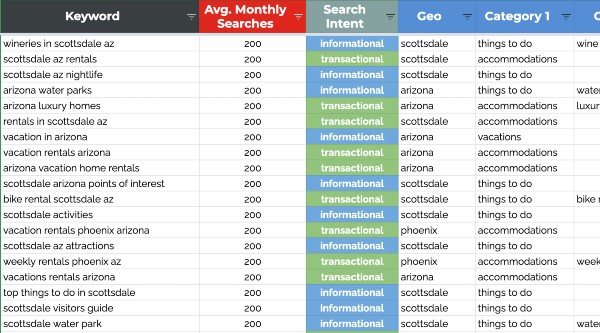
To determine the topics — also called silos or clusters — think about your offerings.
If you have two properties in the same city but one is near the beach and the other is in the entertainment district, you might use those two environments as the beginnings of your two main topics.
You can then use these topics to find missing themes in your vacation rental website content, write blog posts or add to your local area guides.
Keyword Research for Vacation Rental Managers (Step by Step)
- Understand your target audience and have a keen understanding of the types of properties you offer and their features.
- Spend time researching the competition — look at your competitors’ web content and strategy.
- Employ free keyword research tools like Ubersuggest and Google Search Console.
- Consider paying for a competitor research tool like Moz or SEMrush to give you an edge over your local vacation rental competitors.
- Understand search intent and choose keywords that make sense for your business.
- Categorize your keyword list to discover topics.
- Put your vacation rental keyword research to use by using your new keywords in blog posts or local area guides for guests.

